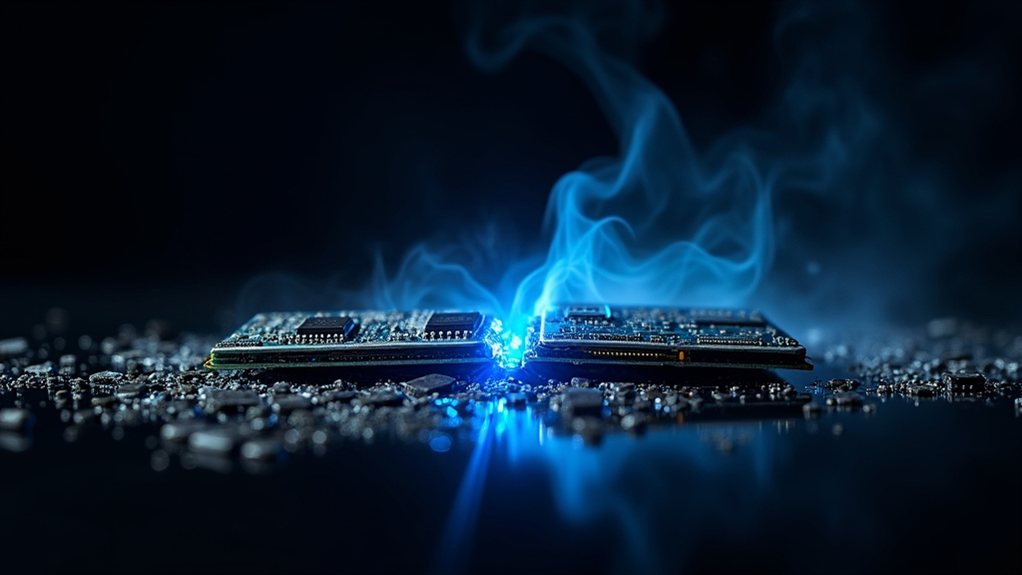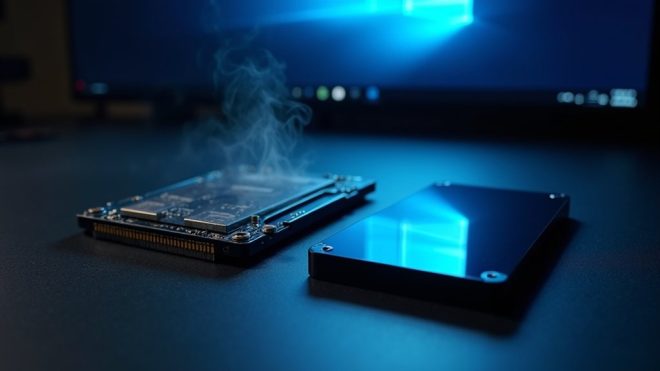Microsoft’s Windows 11 update KB5063878 is triggering widespread SSD failures through aggressive write-back caching behaviors, particularly once drives reach 60% capacity. The issue affects major manufacturers like SanDisk, Corsair, and KIOXIA, with Japanese users hit especially hard. As Microsoft calls these “isolated” incidents, mounting evidence suggests otherwise. Continuous write operations over 50GB can lead to permanent data loss, and some drives simply vanish from File Explorer. Understanding the technical factors reveals a deeper systemic problem.

As Windows 11 continues to evolve with regular updates, a concerning development has emerged as the recent KB5063878 update triggers widespread SSD failures and data corruption across multiple drive manufacturers. The issue, which Microsoft acknowledges but downplays as “isolated,” appears to be far more widespread than initially reported, affecting drives from industry leaders like SanDisk, Corsair, and KIOXIA.
The problem manifests when SSDs reach beyond 60% capacity and face continuous write operations exceeding 50GB – think installing that latest 100GB gaming blockbuster or transferring your entire photo library. Users report their drives suddenly becoming unresponsive, vanishing from File Explorer quicker than a cat video goes viral, and in some cases, suffering irreversible data loss. It’s like watching your digital life play hide and seek, except sometimes it doesn’t come back. Initial investigations reveal that Japanese users have been disproportionately affected by this issue.
What makes this situation particularly troubling is its democratic approach to destruction – it doesn’t discriminate based on SSD brands or controllers. Whether you’re running a top-shelf Phison PS5012-E12 or a more modest DRAM-less controller, the update’s aggressive write-back caching behaviour can turn your lightning-fast SSD into a digital paperweight. Even traditional HDDs aren’t completely immune, though they’re less frequently affected. Experts suggest splitting large files into smaller portions when transferring data to minimize risk.
The technical culprit appears to be a perfect storm of factors: Windows 11’s modified write-back caching behaviour colliding with SSD firmware quirks, particularly when drives are running close to capacity. Think of it as trying to stuff one more item into an already packed suitcase – something’s bound to break. A suspected memory leak in the OS-buffered region compounds the problem, creating a digital domino effect that can culminate in data corruption.
For users, the warning signs often start subtly – File Explorer hanging like a frozen loading screen, SMART status becoming unreadable, and drives playing peek-a-boo in the device manager. As some drives recover after a simple reboot (like turning it off and on again actually worked), others haven’t been so lucky, with data vanishing into the digital void.
Microsoft’s investigation continues, but users shouldn’t wait for an official fix before taking precautions. Regular SSD health monitoring through Windows 11’s built-in tools or third-party software has become more essential than ever.
The lesson here? Keep your SSDs comfortably under capacity, back up religiously, and perhaps think twice before hitting that update button. After all, within the realm of technology, sometimes the newest isn’t necessarily the safest.
Final Thoughts
The issue with SSD wear in Windows 11 highlights the potential risks modern operating systems can pose to hardware longevity. As Microsoft develops patches, it is crucial for users to regularly monitor their SSD health and adjust system settings to reduce unnecessary writes. With solid-state storage being vital for computing performance, safeguarding these components from early wear should be a priority for everyone.
If you’re concerned about your SSD health and need assistance, the Get Computer Repair team is here to help. We can provide guidance on optimizing your system settings to protect your SSD. Don’t hesitate to reach out! Click on our “Contact Us” page to get in touch today.

